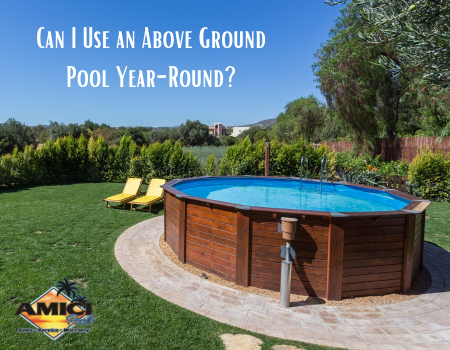An above ground pool can be a fantastic addition to your backyard, offering fun and relaxation during warmer months. However, as the seasons change, many pool owners wonder if it’s possible to use their above ground pool year-round. The answer depends on several factors, including the climate where you live, the type of pool, and the effort you’re willing to put into maintenance and winterizing.
Factors to Consider Before Using an Above Ground Pool Year-Round
 Climate and Weather Conditions
Climate and Weather Conditions
The first thing to consider when deciding whether to use an above ground pool year-round is your local climate. For pool owners living in colder regions, freezing temperatures can cause significant issues for pools that are not properly winterized.
- Cold Winters: In regions where temperatures regularly drop below freezing, leaving an above-ground pool open year-round is not recommended. Ice can damage pool walls, liners, and plumbing, leading to costly repairs. Pools are typically winterized in such areas by draining water from the pool and pipes, covering the pool, and protecting equipment.
- Milder Climates: If you live in a region with mild winters, it’s possible to use your above-ground pool year-round with the right equipment and preparation. You’ll need to ensure that the water remains at a stable temperature and that the pool is properly maintained during colder months.
- Type of Above Ground Pool
Not all above ground pools are built to withstand year-round use. Some are designed primarily for seasonal use, while others can handle extended operation with proper care.
- Standard Above Ground Pools: These pools are often made of steel, resin, or aluminum and are not typically insulated. They can withstand cold weather but require winterizing when temperatures drop.
- All-Season Pools: Some above ground pools are specifically designed for year-round use and come with reinforced walls and insulation to help protect the pool from colder temperatures. These pools often include heating systems, covers, and other accessories to make winter use more feasible.
- Heating the Pool
If you live in a region where temperatures dip during the winter but don’t reach freezing levels, heating your above-ground pool is essential to maintaining comfortable swimming conditions. Without a pool heater, water temperatures can drop to uncomfortable or unsafe levels, making it difficult to enjoy the pool.
- Heaters: There are different types of pool heaters available, including gas, electric, and solar heaters. Each type has its benefits and drawbacks, but gas and electric heaters tend to be the most effective for maintaining year-round pool temperatures. Solar heaters are more energy-efficient but may not provide sufficient warmth in colder climates.
- Solar Covers: If you’re looking for a more budget-friendly option, a solar cover can help retain heat in your pool and keep the water warmer for longer. Solar covers trap heat from the sun during the day, reducing the need for a heater.
- Pool Maintenance Year-Round
Maintaining your above-ground pool year-round is more involved than just the regular upkeep during the summer months. You’ll need to adjust your maintenance routine according to the changing weather conditions.
- Water Chemistry: Pool chemistry can fluctuate with changes in temperature and weather. Even in mild climates, you’ll need to check and adjust your pool’s pH, chlorine, and alkalinity levels regularly to prevent algae growth, cloudy water, or imbalanced chemicals.
- Cleaning and Filtration: Your pool filter will need to be maintained year-round as well. In colder months, you may need to run your pool’s pump less frequently, but it’s still important to ensure that your filter is operating properly. Regular cleaning of the pool’s surface and bottom will help maintain water quality.
- Debris and Weather Protection: Leaves, dirt, and debris can still accumulate in your pool even in colder months. A pool cover will help protect your pool from debris and prevent the need for constant cleaning during the offseason.
- Winterizing Your Pool
If you plan to close your pool during the colder months, proper winterization is critical to avoid potential damage. Winterizing involves several steps, including:
- Draining Water: Lowering the water level in your pool below the skimmer and returning the plumbing system to prevent freezing and cracking.
- Covering the Pool: Use a durable pool cover that will protect the pool from snow, ice, and debris.
- Removing Equipment: Take out pool accessories like ladders, pumps, and heaters to prevent damage from freezing temperatures.
Even in mild climates, you should take steps to protect the pool when it’s not in use, particularly in the fall and early spring.
While using an above ground pool year-round is possible, it requires planning, proper equipment, and regular maintenance. If you live in a mild climate and invest in a pool heater and proper cover, you can enjoy your above ground pool throughout the year. However, in colder climates, winterizing your pool is essential to avoid damage from freezing temperatures. Always assess the condition of your pool and make adjustments to your maintenance routine to ensure it stays in optimal condition, no matter the season. Contact professionals to guide you in making the decision about the type of pool to get.
